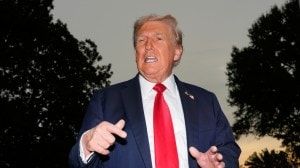‘India, Pak must bond for sake of South Asia’
On Fefbuary 1, when King Gyanendra imposed emergency and ordered a freeze on press, his overcautious men did not bother to check on the BBC ...

On Fefbuary 1, when King Gyanendra imposed emergency and ordered a freeze on press, his overcautious men did not bother to check on the BBC Nepal Service — whose contents were relayed on Radio Nepal — as was the practise. If they had, the views of editor-publisher of Himal, Kanak Mani Dixit, would have been blipped off as he wondered aloud on BBC whether the King had struck at his own dynasty.
He was jailed briefly for speaking out. But Dixit continues to air his concerns. In Delhi, to see President Musharraf watch cricket, Dixit spoke on the importance of press freedom and the need for more people to people contact.
Dixit says there should be continuous contact between India and Pakistan because such engagement portends well for South Asia. The day-long deliberations leading to economic interactions between the two will lead to a resurgence in economic activities in South Asia as a whole.
‘‘Nepal has an open border with India and economic resurgence between India and Pakistan augurs well for the sub-continent,’’ said Dixit.
To attend South Asia Editors’ Guild meeting, Dixit says since the 1990s, it was the media that progressed in leaps and bounds, and it was the media again that got hit the most, with the King’s actions depriving it of its means to express and communicate.
Journalists were intimidated and placed under detention, publications were forced to toe the government line and harassment became the order of the day. ‘‘Smaller tabloids faced extra harassment because of their political content,’’ says Dixit. Tabloids in Nepal are not ‘tabloidish’ in content as is understood, they are political in content and critical of the government.
Little has changed in the last few months but the press too has shown that it cannot be taken for granted. ‘‘We had an article on the cutting of trees in Kathmandu and how the authorities were doing very little to prevent depletion of green cover,’’ says Dixit.
The story became a metaphor for democracy and freedom.
With a little over 400 newspapers and dailies and more than 45 radio stations in Nepal, freedom of the press is still hard to come by. Radio stations, unlike their Indian counterparts, are finding it tough to simply entertain as ordered by the government.



- 01
- 02
- 03
- 04
- 05



























